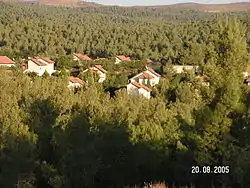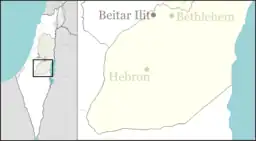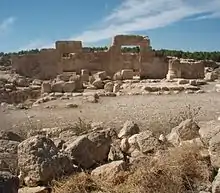Livne
לִבְנֶה, ליבנה | |
|---|---|
| Hebrew transcription(s) | |
| • standard | Livneh |
| • unofficial | Livna |
 | |
 Livne | |
| Coordinates: 31°21′21″N 35°4′12″E / 31.35583°N 35.07000°E | |
| District | Judea and Samaria Area |
| Council | Har Hevron |
| Region | West Bank |
| Affiliation | Amana |
| Founded | 1982 |
| Population (2021)[1] | 572 |
| Website | shani-livna.org |

Livne (Hebrew: לִבְנֶה, lit. 'Birch'), also known as Shani (Hebrew: שָׁנִי, lit. 'Scarlet') is an Israeli settlement. Located in the southern Judaean Mountains, straddling the Green Line and therefore partly in Israel and partly in the West Bank, it is organised as a community settlement and falls under the jurisdiction of Har Hevron Regional Council. In 2021 it had a population of 572.[1]
The international community considers Israeli settlements in the West Bank illegal under international law, but the Israeli government disputes this.[2]
Name
Livne is named after biblical Livna (Hebrew לבנה) and was allocated to the priests (kohanim) (Book of Joshua 21:13).
History
Modern-day Shani-Livne was established in 1982,[3] It is located on the outskirts of Yatir Forest.[4] with residents moving into permanent housing in 1989. The community was renamed Shani in memory of Shani Shacham, the son of former members killed in the line of duty.[5]
Economy
Residents working in Beer Sheva, Arad, at the Dead Sea Works, communities of the Har Hevron Regional Council, and in the central region. The Yatir region is known among Israelis for its grapes and wine.[6]
References
- 1 2 "Regional Statistics". Israel Central Bureau of Statistics. Retrieved 22 February 2023.
- ↑ "The Geneva Convention". BBC News. 10 December 2009. Retrieved 27 November 2010.
- ↑ Report on the Palestinians under Israeli rule N. 137, Page 23, 1984
- ↑ The Yatir Forest Archived 2015-06-23 at the Wayback Machine My Country Israel
- ↑ To live in the middle of forest, does it get any better…? Archived 2013-11-11 at the Wayback Machine Shani-Livna
- ↑ Har Hevron Jewish villages information Archived 2015-11-14 at the Wayback Machine Har Hevron Regional Council